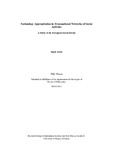Citation link:
https://nbn-resolving.org/urn:nbn:de:hbz:467-6084| DC Field | Value | Language |
|---|---|---|
| dc.contributor.author | Saeed, Saqib | - |
| dc.date.accessioned | 2019-09-02T09:59:27Z | - |
| dc.date.available | 2012-04-2T12:12:12Z | - |
| dc.date.available | 2019-09-02T09:59:27Z | - |
| dc.date.issued | 2012 | - |
| dc.description.abstract | Civil society organizations and other networks of social activists have gained significant importance in supporting citizens, as states are rolling back from their duties. In order to be an effective force, these networks have become transnational in their operations. These transnational networks are typically characterized by a lack of resources, an absence of formal hierarchical structures and differences in languages and culture among the activists. Modern technologies could help these networks in improving their working. Technology support for transnational social movements and civil society organizations is an important field of research not only due to the increased political importance of this sector in a globalizing world but also due to their organizational characteristics. In order to design appropriate technological support for social activists' etworks, it is important to understand their work practices, which widely differ from traditional businessorganizations. In this thesis, I present results from a long-term ethnographical field study of the European Social Forum (ESF), a network of heterogeneous political activist organizations. In this network different actors organize a periodic (biannual) event. During my data collection phase, the 5th and 6th European Social Fora were held in Malmo (2008) and Istanbul (2010), in which some 13,000 and 3,000 activists participated, respectively. I particularly focused on the usage of information and communication technologies (ICTs) in preparing and conducting ESF events and knowledge sharing practices during the transition phase. I specifically highlighted coordination and knowledge management practices to understand the potential for ICT support. The thesis describes complex social practice of organizing ESF events. I use the term fragmented meta-coordination to highlight coordination in this type of practice. Mundane ICT applications, such as a mailing list and a content management system, play a central role in enabling different aspects of fragmented meta-coordination. The findings also indicate how lack of resources, organizational distribution, and technical limitations hamper the preparation process and reduce transparency of political decision-making. I also present a specific type of knowledge, termed as nomadic knowledge. It is required periodically by different actors and travels along foreseeable paths between groups or communities of actors. This type of knowledge lets us question generally held assumptions about the way knowledge is enacted. Nomadic knowledge is a specialized type of knowledge, which is enacted in a discontinuous pattern by a changing set of actors and further flows on a defined trajectory. This knowledge is quite important but is required sporadically, so it has varying levels of importance for stakeholders at different instances of time. The limited interest of knowledge holders after the creation of knowledge makes knowledge sharing process complex. Furthermore, new actors overloaded by the tasks at hand often ignore the knowledge sharing aspect due to urgency. The thesis provides insights into the complexity of managing nomadic knowledge and implications for organizational processes. Moreover, the issues, which make the transfer of nomadic knowledge complex, are also discussed and the potentials for ICT support for management and transfer of nomadic knowledge are also highlighted. Moreover, the thesis provides a historic perspective on the evolution of ICT artifacts in the organizational boundaries. A user-centered evaluation of two technology artifacts (European mailing list and OpenESF) is also carried out to identify design improvements. The empirical findings highlight how the mailing list is used for a variety of different activities such as collaborative work, decision-making, coordination and information sharing. I discuss the findings with regard to the discourse on cooperative work and come up with implications for design. The analysis highlights central organizational and technological challenges related to ICT appropriation in transnational networks of social activists. As a next step it is important to design appropriate prototypes aligned with highlighted work practices to evaluate them in the field and realign if necessary. In order to better support this application domain universities and community-based organizations need to work jointly on action research projects to improve organizational processes of civil society organizations. | en |
| dc.identifier.uri | https://dspace.ub.uni-siegen.de/handle/ubsi/608 | - |
| dc.identifier.urn | urn:nbn:de:hbz:467-6084 | - |
| dc.language.iso | en | en |
| dc.rights.uri | https://dspace.ub.uni-siegen.de/static/license.txt | de |
| dc.subject.ddc | 330 Wirtschaft | de |
| dc.subject.other | Technology Appropriation | en |
| dc.subject.other | Knowledge Management | en |
| dc.subject.other | Ethnographic Study | en |
| dc.subject.other | Human Centered Design | en |
| dc.title | Technology appropriation in transnational networks of social activists : a study of the European Social Forum | en |
| dc.type | Doctoral Thesis | de |
| item.fulltext | With Fulltext | - |
| ubsi.date.accepted | 2012-03-28 | - |
| ubsi.publication.affiliation | Fakultät III - Wirtschaftswissenschaften, Wirtschaftsinformatik und Wirtschaftsrecht | de |
| ubsi.subject.ghbs | QGTC | - |
| ubsi.type.version | publishedVersion | de |
| Appears in Collections: | Hochschulschriften | |
This item is protected by original copyright |
Page view(s)
814
checked on Nov 25, 2024
Download(s)
109
checked on Nov 25, 2024
Google ScholarTM
Check
Items in DSpace are protected by copyright, with all rights reserved, unless otherwise indicated.


